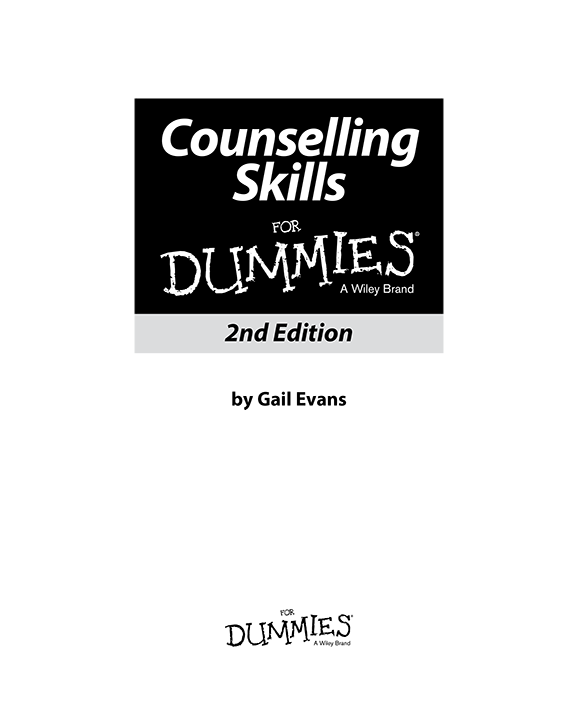
Counselling Skills For Dummies, 2nd Edition
Published by: John Wiley & Sons, Ltd. , The Atrium, Southern Gate, Chichester, www.wiley.com
This edition first published 2013
2013 John Wiley & Sons, Ltd, Chichester, West Sussex.
John Wiley & Sons Ltd, The Atrium, Southern Gate, Chichester, West Sussex, PO19 8SQ, United Kingdom
For details of our global editorial offices, for customer services and for information about how to apply for permission to reuse the copyright material in this book please see our website at www.wiley.com .
All rights reserved. No part of this publication may be reproduced, stored in a retrieval system, or transmitted, in any form or by any means, electronic, mechanical, photocopying, recording or otherwise, except as permitted by the UK Copyright, Designs and Patents Act 1988, without the prior permission of the publisher.
Wiley publishes in a variety of print and electronic formats and by print-on-demand. Some material included with standard print versions of this book may not be included in e-books or in print-on-demand. If this book refers to media such as a CD or DVD that is not included in the version you purchased, you may download this material at www.dummies.com . For more information about Wiley products, visit www.wiley.com .
Designations used by companies to distinguish their products are often claimed as trademarks. All brand names and product names used in this book are trade names, service marks, trademarks or registered trademarks of their respective owners. The publisher is not associated with any product or vendor mentioned in this book.
Limit of Liability/Disclaimer of Warranty: While the publisher and author have used their best efforts in preparing this book, they make no representations or warranties with the respect to the accuracy or completeness of the contents of this book and specifically disclaim any implied warranties of merchantability or fitness for a particular purpose. It is sold on the understanding that the publisher is not engaged in rendering professional services and neither the publisher nor the author shall be liable for damages arising herefrom. If professional advice or other expert assistance is required, the services of a competent professional should be sought.
For general information on our other products and services, please contact our Customer Care Department within the U.S. at 877-762-2974, outside the U.S. at (001) 317-572-3993, or fax 317-572-4002.
For technical support, please visit www.wiley.com/techsupport .
A catalogue record for this book is available from the British Library.
ISBN 978-1-118-65732-4 (pbk); ISBN 978-1-118-65747-8 (ebk); ISBN 978-1-118-65756-0 (ebk)
Printed in Great Britain by TJ International, Padstow, Cornwall
10 9 8 7 6 5 4 3 2 1
Introduction
C ounselling skills are often referred to as active listening skills, which makes them sound simple after all, everyone knows how to listen, dont they? In reality, though, the following is true:
 Listening isnt so simple after all.
Listening isnt so simple after all.
 Truly listening is a very powerful tool.
Truly listening is a very powerful tool.
 Finding out how to truly listen is intriguing, worthwhile, and exciting.
Finding out how to truly listen is intriguing, worthwhile, and exciting.
 You can discover a lot about yourself in the process.
You can discover a lot about yourself in the process.
 Active listening skills improve helping (and other) conversations and your relationships as a result.
Active listening skills improve helping (and other) conversations and your relationships as a result.
Active listening skills are usually associated with a helping role but they are the foundation for helping conversations in many different contexts where interpersonal skills are important.
About This Book
For most of my adult life, and even earlier, I have been fascinated by human beings and found great personal satisfaction and a sense of achievement from helping people when theyre distressed or anxious. My goal in this book is to impart my enthusiasm and enduring interest for helping people with their concerns through the medium of the listening relationship. My own experience has been that discovering how to help people with their difficulties is a life-long process, because people and their situations are complex. This stretched me and kept me hooked even when the going got tough. What I didnt expect at the outset was how much I would find out about myself, and how much I needed to discover about myself to be a better listener. What you will notice in this book is the emphasis on growing your self-awareness as well as increasing your knowledge and developing your skills.
Of course I hope that this book is going to help make you a brilliant listening helper, but there are some things it cannot achieve. This book cant
 Provide you with direct practice. You need to find people to practise on, which poses an ethical dilemma (this is only the beginning of the ethical dilemmas in this area of work!). Counselling skills can be very powerful tools for opening peoples emotions. You need to be aware of this and decide whether the other person is a willing participant and whether using your developing skills is likely to help.
Provide you with direct practice. You need to find people to practise on, which poses an ethical dilemma (this is only the beginning of the ethical dilemmas in this area of work!). Counselling skills can be very powerful tools for opening peoples emotions. You need to be aware of this and decide whether the other person is a willing participant and whether using your developing skills is likely to help.
 Give you feedback, which is vital for your progress. I do encourage you, however, to practise and find ways of getting feedback from others about how youre doing with your listening skills.
Give you feedback, which is vital for your progress. I do encourage you, however, to practise and find ways of getting feedback from others about how youre doing with your listening skills.
 Tell you absolutely everything you need to know. Ive had to be selective because this fascinating activity contains so much information.
Tell you absolutely everything you need to know. Ive had to be selective because this fascinating activity contains so much information.
 Make you a counsellor. Listening skills are an important part of counselling (sometimes called psychotherapy, or just therapy). This book isnt about being a counsellor. You may have ambitions to become a counsellor and if so, I hope this book helps you along the way to deciding whether this is a rewarding career for you. Counsellor training courses usually require you to have grounding in the theory and practice of counselling skills in an environment where you can practise and get feedback on your developing skills from willing (well mostly!) participants. You can find many counselling skills courses in Further and Higher Education colleges and from private providers around the country.
Make you a counsellor. Listening skills are an important part of counselling (sometimes called psychotherapy, or just therapy). This book isnt about being a counsellor. You may have ambitions to become a counsellor and if so, I hope this book helps you along the way to deciding whether this is a rewarding career for you. Counsellor training courses usually require you to have grounding in the theory and practice of counselling skills in an environment where you can practise and get feedback on your developing skills from willing (well mostly!) participants. You can find many counselling skills courses in Further and Higher Education colleges and from private providers around the country.
Throughout the book I use the terms listening helper or helper to refer to you (and me) and help-seeker or speaker to refer to the person who needs to talk. The phrases counselling skills , listening skills , and active listening skills are used interchangeably to mean the set of skills that contribute to effective listening help. I have tried to use everyday terms but whenever doing so isn't possible, I explain what the technical terms mean. Web addresses are set in monofont . Even-numbered chapters use female pronouns and odd-numbered chapters are male, to be fair to both genders!
Foolish Assumptions
In writing this book, I assume a few things about you, the reader. I assume that:


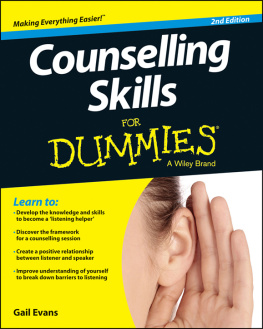





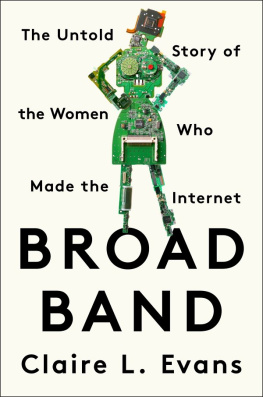

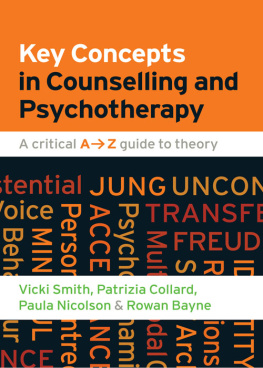

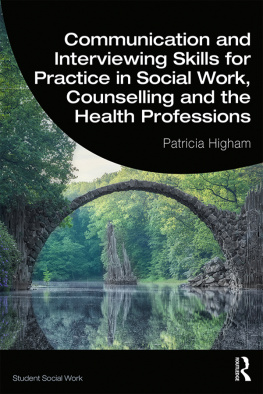
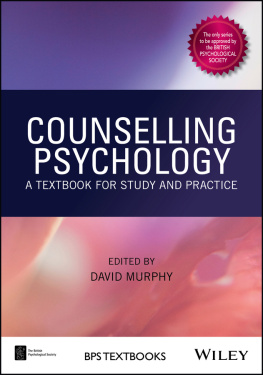
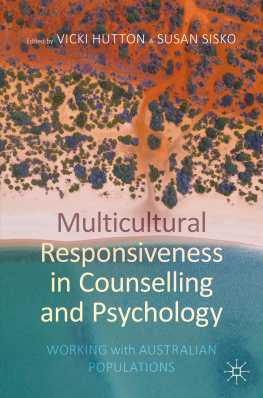
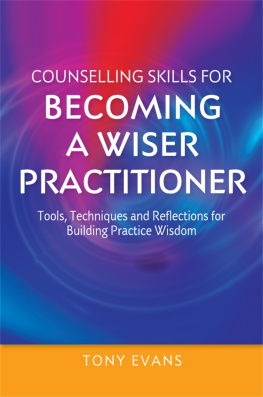


 Listening isnt so simple after all.
Listening isnt so simple after all.